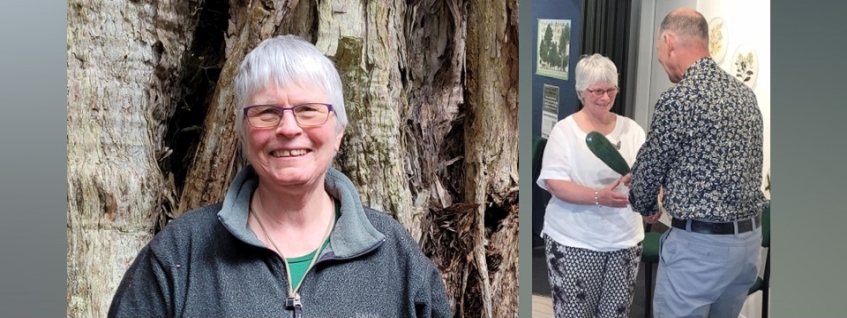Allan Mere Award for 2022:
Dr Carol West

Left: Dr Carol West. Photo: Julia Brooke-White. Right: Carol receiving the Allan Mere from Anthony Wright. Photo: Tim Park.
After no award being made in 2021, the NZBS Committee is pleased to announce that the 2022 award of the Allan Mere is to Dr Carol West. Carol was nominated by the Wellington Botanical Society and supported by the Waikato Botanical Society. A summary of the nomination is given below.
Carol has contributed to the study and preservation of New Zealand flora for more than forty years. Areas of her focus include vegetation regeneration after a large-scale disturbance and pest plant species invasions. She has taken on many roles to study, protect and cherish New Zealand’s indigenous flora, and encouraged many others to do the same.
Carol completed her MSc at the University of Auckland on the regeneration of native plants on Tiritiri Matangi Island; this was followed with a doctorate on the population ecology of Beilschmiedia tawa at Pureora Forest, commenting on the impact of logging native forest at different intensities. This was important work at a time when ‘selective logging’ of native forests was a controversial issue.
Then for her first employment, she joined Botany Division, Department of Scientific and Industrial Research in 1984 and was based for three years at the Taitā Substation with Tony Druce and Ian Atkinson. Her post-doctoral work on the impact and ecology of Clematis vitalba filled an important gap in understanding one of our most significant pest plants. Her next employment was as editor of the New Zealand Journal of Botany until 1992.
Her third employment was as the Conservancy Scientist for the Department of Conservation (DoC) Southland. In this role, Carol provided science advice to the DoC Southland Senior Management Team and Biodiversity staff. She drove the establishment of the Southland Resource Inventory, improved data recording and management for DoC Southland and wrote the first Subantarctic Research Strategy. Monitoring projects included weeds on the Fiordland coast and general monitoring of rare Southland ecosystems. She was a strong advocate for protection, management and enhancement of indigenous ecosystems in Southland and for weed control in the region, including wildling pines.
Carol returned to Wellington to continue her work with DoC as the Threats Management Manager and then Director Terrestrial Ecosystems. Even while working at a senior level of management, she continued her scientific work centred on the impacts of plant and animal pests on a wide range of ecosystems. As part of this work at DoC, Carol has played a significant role in the Kermadecs flora where she has collected and recorded the plants and monitored plots and pest incursions for many years. She continues to contribute to the Kermadec flora through her analysis of repeated measurement of the vegetation plots. She also oversaw the very important weed eradication programme that started in 1990 and ran until Covid forced weeders to leave Raoul Island. In 2017, Carol ‘retired’ to the position of Honorary Research Associate of DoC, keen to work on writing and publishing her research, particularly her work on the Kermadec Islands.
Volunteer work
Outside of her official work, Carol has contributed to many organisations that study and protect our native flora. While in Invercargill, she was a founding member of the Ōtatara Landcare Group and was actively involved with the Southland Natural History Field Club. In Wellington, she is an avid supporter of Ōtari-Wilton’s Bush, the only botanic garden dedicated to New Zealand plants. She has led many tours through the garden and bush, raising both funds and awareness, and has been Chairperson of the Ōtari-Wilton’s Bush Trust since July 2020. Carol has been an active and enthusiastic member of the Wellington Botanical Society for more than 30 years where she has served on their committee many times: as secretary, president and vice-president. In addition to this, she was a founding member of the New Zealand Botanical Society and has served on its committee since 1988. Carol is very supportive of amateur and beginner botanists and a mentor for DoC staff and young ecologists in Southland.
Congratulations
I remember occasionally assisting Carol in the field when she was completing her MSc and PhD at the University of Auckland – she was always keen to learn and capture plenty of data to be able to show what was really happening. Through her various work experiences, she became an excellent administer/manager providing DoC with quality scientific based advice. On behalf of the Society, congratulations Carol and our President hopes to present you with the Allan Mere later in the year at a Wellington Botanical Society meeting.
Ewen Cameron, Secretary, New Zealand Botanical Society
Citation reproduced from the New Zealand Botanical Society Newsletter, No. 149, Sept 2022.